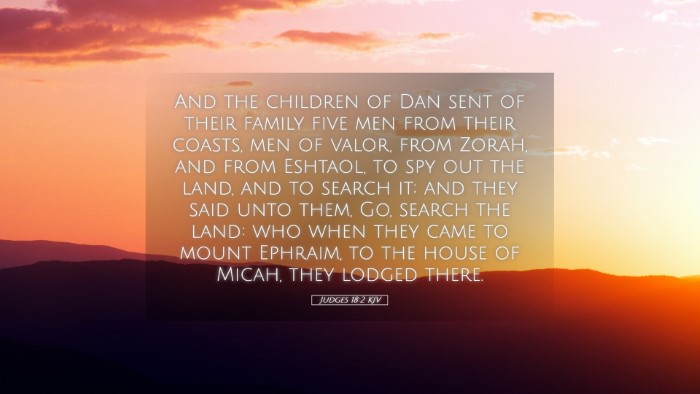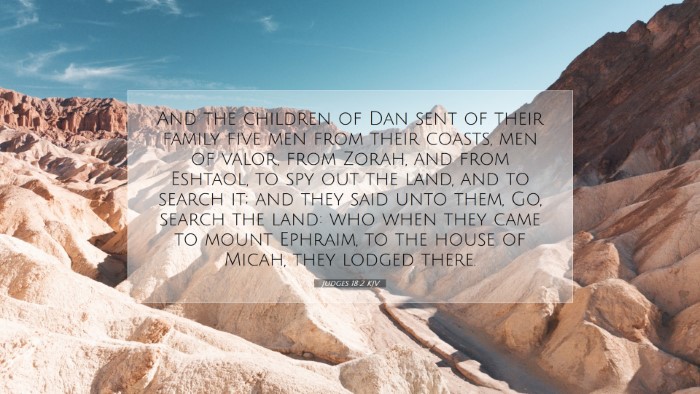Commentary on Judges 18:2
This verse serves as a key introduction to the events unfolding in Judges 18, presenting profound theological and historical implications.
Verse Overview
Judges 18:2 states: "And the children of Dan sent of their family five men from their coasts, men of valour, from Zorah and Eshtaol, to spy out the land, and to search it; and they said unto them, Go, search the land: who when they came to mount Ephraim, to the house of Micah, they lodged there." This verse underscores the actions of the Danites as they seek resources and territory in light of their inheritance.
Contextual Background
The narrative takes place during a period of Israelite history marked by disunity and moral decline. The tribe of Dan found themselves without a sufficient inheritance, as their assigned territory was too limited to fulfill their needs.
- Historical Context: In the distribution of land among the tribes, Dan was unable to secure its own territory, leading them to pursue further conquests.
- Thematic Elements: This passage highlights themes of search for security, identity, and the tendency of the Israelites to deviate from God’s intended paths.
Insights from Matthew Henry
Matthew Henry emphasizes the Danites’ quest for land as a reflection of their spiritual and physical state. He notes that:
- The Danites are seen as taking matters into their own hands, indicative of their departure from relying on God's guidance.
- Henry also highlights the implications of disobedience, suggesting that such actions represent a broader trend where the Israelites act without divine sanction.
Henry further reflects on the nature of the five men chosen for the mission, observing that they embodied a spirit of valor but were acting outside of God's will.
Albert Barnes' Perspective
Albert Barnes provides a broader view of the socio-political motivations behind the actions of the tribe of Dan:
- He notes the significance of inquiries into neighboring territories, suggesting that this was a common practice among tribes seeking new opportunities.
- Barnes discusses the moral implications of the Danites’ actions, indicating that their reliance on human wisdom rather than divine direction led them away from God’s blessings.
- He highlights the importance of leadership and unity within the tribes, noting that the lack of such elements often leads to fragmentation as seen in this instance.
Adam Clarke’s Analysis
Adam Clarke offers an in-depth exegetical analysis of the verse, focusing on the choices made by the tribe of Dan:
- Clarke points to the geographical locations mentioned, Zorah and Eshtaol, emphasizing the strategic choices of the Danites in sending spies to gather information.
- He proposes that the choice of scouts signifies an intent to expand influence and territory, underscoring the historical context of tribal migrations and territorial claims.
- Clarke also raises questions regarding the spiritual state of the Danites, suggesting that their actions may reveal deeper issues of faith and reliance on God.
Theological Implications
This single verse invites readers to contemplate several crucial theological themes:
- Human Initiative vs. Divine Guidance: The actions of the Danites raise questions about the balance between taking initiative and seeking God's direction.
- Identity and Territory: The longing for land is not merely a physical desire but a reflection of one's identity in relation to God’s promises.
- Consequences of Disobedience: The failure to heed God's commands can lead to moral and spiritual decline, a theme prevalent throughout Judges.
Practical Applications
For pastors, students, and theologians, Judges 18:2 serves as a reminder of the need for diligent spiritual discernment in decision-making:
- Seek God's Will: Emphasizes the importance of prayer and seeking God's guidance before venturing into new endeavors.
- Community and Collaboration: Encourages collaborative efforts in church and ministry for unified mission and growth.
- Awareness of Temptation: Warns against the temptation to pursue personal ambitions at the expense of divine direction.
Conclusion
Judges 18:2 encapsulates critical elements of Israel’s narrative during a tumultuous period marked by conflict and spiritual struggle. The insights from the public domain commentaries of Matthew Henry, Albert Barnes, and Adam Clarke remind us of the importance of divine reliance, the search for identity, and the potential consequences of human initiative without God. As we study this verse, let us reflect on our own spiritual journeys and the choices we make within the framework of God’s will.


